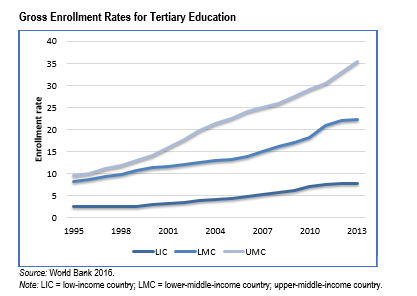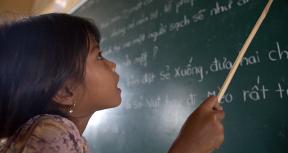Background: A Growing Global Demand for Higher Education Enrollment
Higher Education fulfills multiple roles that go beyond educating students. Specialists often identify three distinct but interrelated missions: (i) teaching and learning; (ii) research; and (iii) community engagement.
Higher education can make an important contribution to building a stronger society, ending extreme poverty, and boosting shared prosperity. It can serve the community by contributing knowledge and advanced skills as well as basic competencies and research. Knowledge plays a growing role in the global economy, driving economic growth and productivity. Economic studies have shown a positive relationship between education and economic growth, particularly those that take into account the quality of education. Higher Education fulfills multiple roles that go beyond educating students. Specialists often identify three distinct but interrelated missions: (i) teaching and learning; (ii) research; and (iii) community engagement
Higher education systems around the world face a growing demand for enrollment that is increasingly driven by non-traditional students. Limited capacity to respond to demand among existing public institutions has, in turn, led to significant growth in private provision. Furthermore, there is increased demand among employers for skilled and professional workers and increased importance in modern economies for research and development to increase competitiveness. In this context, governments need to explore (i) the growing demand for higher education; (ii) the role of access, including equity; (iii) the quality and relevance of teaching and its implications for employability; (iv) the role of research and development in higher education; and (v) the role of systems reform within higher education.
To address these challenges, higher education needs to address: (i) the growing demand for higher education; (ii) the role of access, including equity; (iii) the quality and relevance of teaching and its implications for employability; (iv) the role of research and development in higher education; and (v) the role of systems reform within higher education.
For more information, see Chapter 2: Higher Education in Development: Trends and Challenges
World Bank Group Support for Higher Education
The World Bank Group’s twin goals have redefined the rationale for engagement across all sectors. Although the World Bank Group has never had an explicit strategy for higher education, institutional- and regional-level strategies and knowledge work anchor the World Bank’s engagement in supporting and promoting (i) greater access and equity, (ii) relevant and quality teaching and research, (iii) improved management and financial systems, and (iv) institutional diversification and innovation. The International Finance Corporation (IFC) has aligned itself with the World Bank’s approach and focuses on access and equity, relevance, and quality. Additionally, IFC has developed a specific education strategy that focuses on its investments in post-secondary education.
From fiscal years 2003–16, the World Bank spread support across dedicated “core” higher education projects (44 percent) and “non-core” projects, for which higher education is embedded either in a broader education project or as a component in a project led by another global practice (56 percent). Over the same period, IFC committed $722 million through 42 investments and $7.8 million in advisory services, representing 69 percent of all IFC education commitments.
For more information, see Chapter 3: The World Bank Group and Higher Education
Conclusions and Recommendations
Recommendation 1: Carry out a strategic review of the World Bank Group’s support for higher education and make strategic choices. Through a strategic review, the World Bank Group should reflect on its institutional mission and on the global development agenda. Based on this, it should design a focused approach for higher education that takes into account country needs.
Recommendation 2: Improve the quality of results indicators, ensure their adequate measurement, and further build and draw on the evidence base for higher education in both World Bank and IFC investments. The World Bank Group should design improved monitoring instruments and define new indicators to capture the desired outcomes. The World Bank Group should develop an evidence base of what works in higher education and support rigorous case studies and impact evaluations to understand what interventions are effective and how they can be replicated. Projects should also more clearly show what evidence they draw on and identify where there are gaps.
Recommendation 3: Increase the participation of employers and the integration of employers’ perspectives in World Bank and IFC investments. The World Bank can promote the integration of employer and private sector groups in higher education reforms, such as participation in independent accreditation institutions and university governance bodies. Both the World Bank and IFC could promote more collaboration between the employers and higher education institutions in preparing grants to improve learning and in developing curricula reform.
Recommendation 4: Develop stronger coordination among global practices. This may include the establishment of formal and informal mechanisms to facilitate dialogue and to allow the Education Global Practice to engage better with other units. This could potentially include participation of World Bank Group higher education specialists in more non-core projects.
Recommendation 5: Develop a more comprehensive understanding of external financing for higher education. Identify more thoroughly the landscape of public and private organizations that provide financing of higher education and analyze areas of overlap and possible collaboration. As appropriate, the World Bank can establish a convening role to improve coordination among donor organizations and other international partners involved in higher education.
For more information, See Chapter 5: Conclusions and Recommendations




